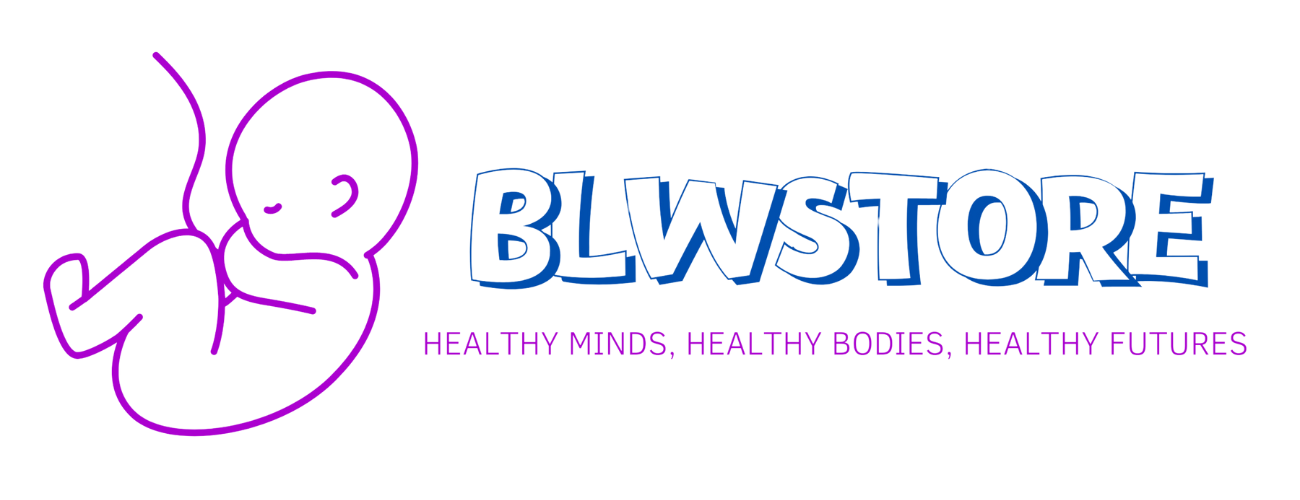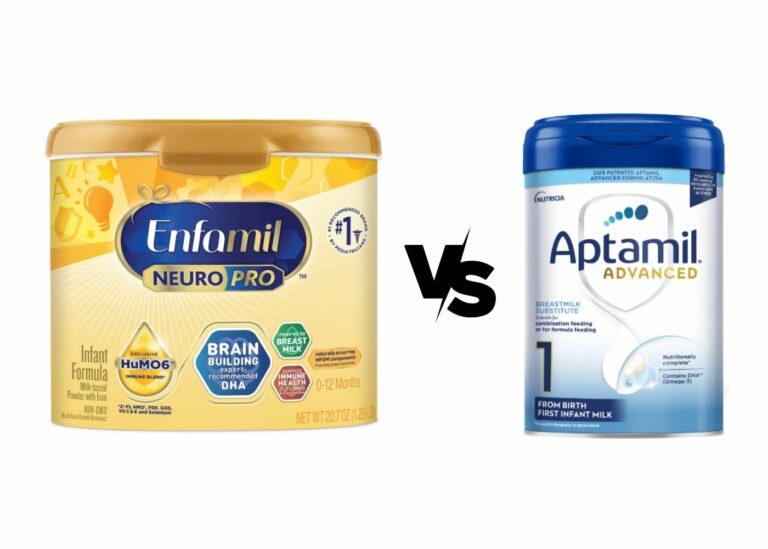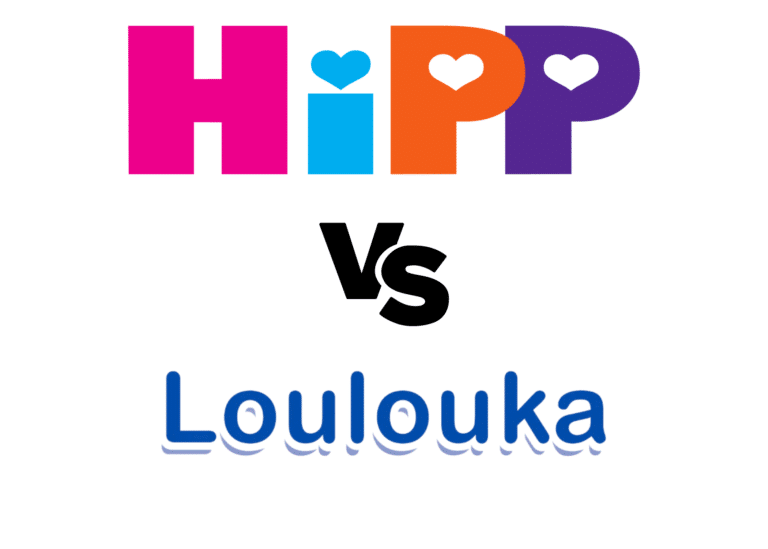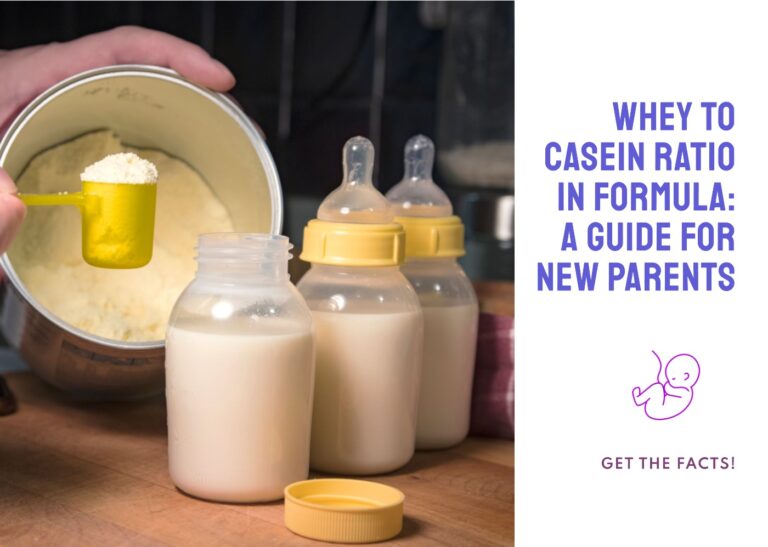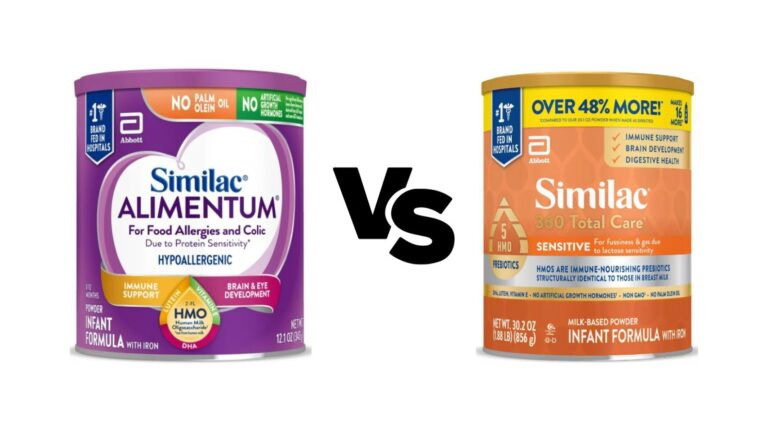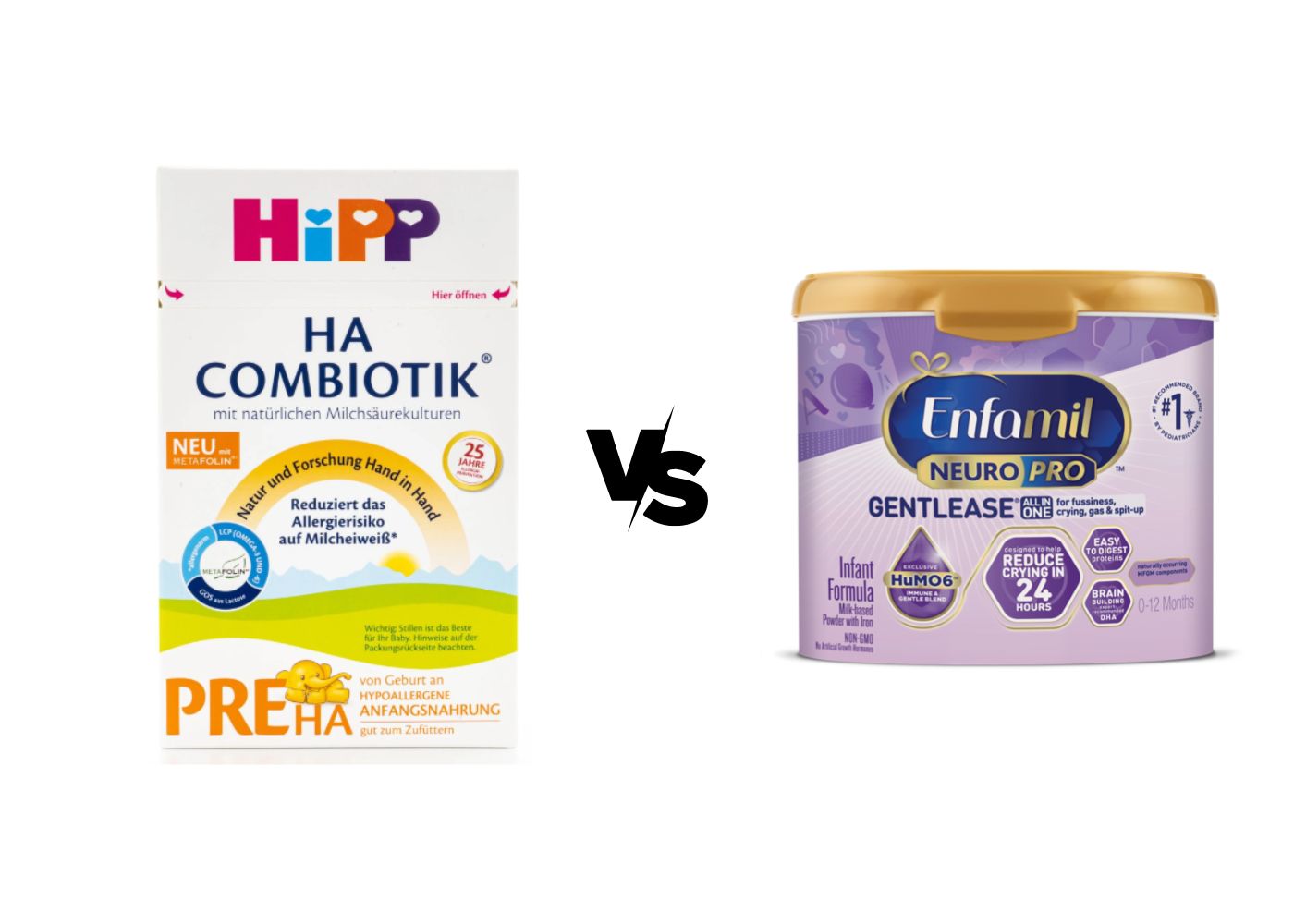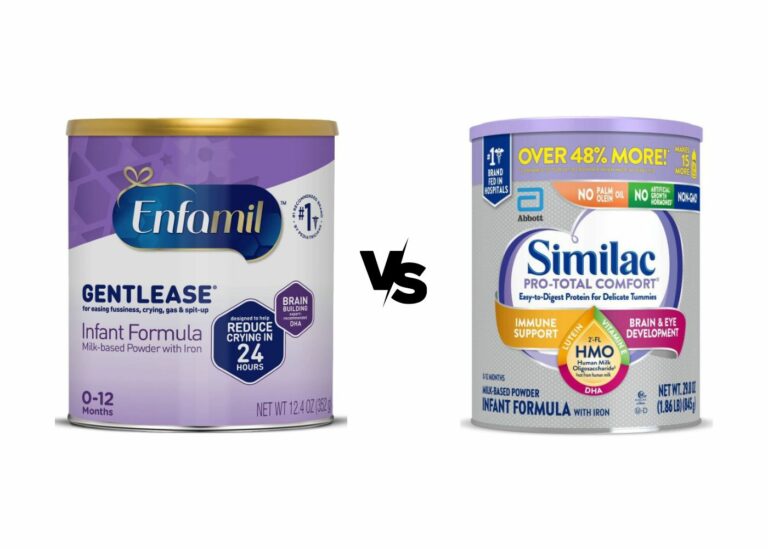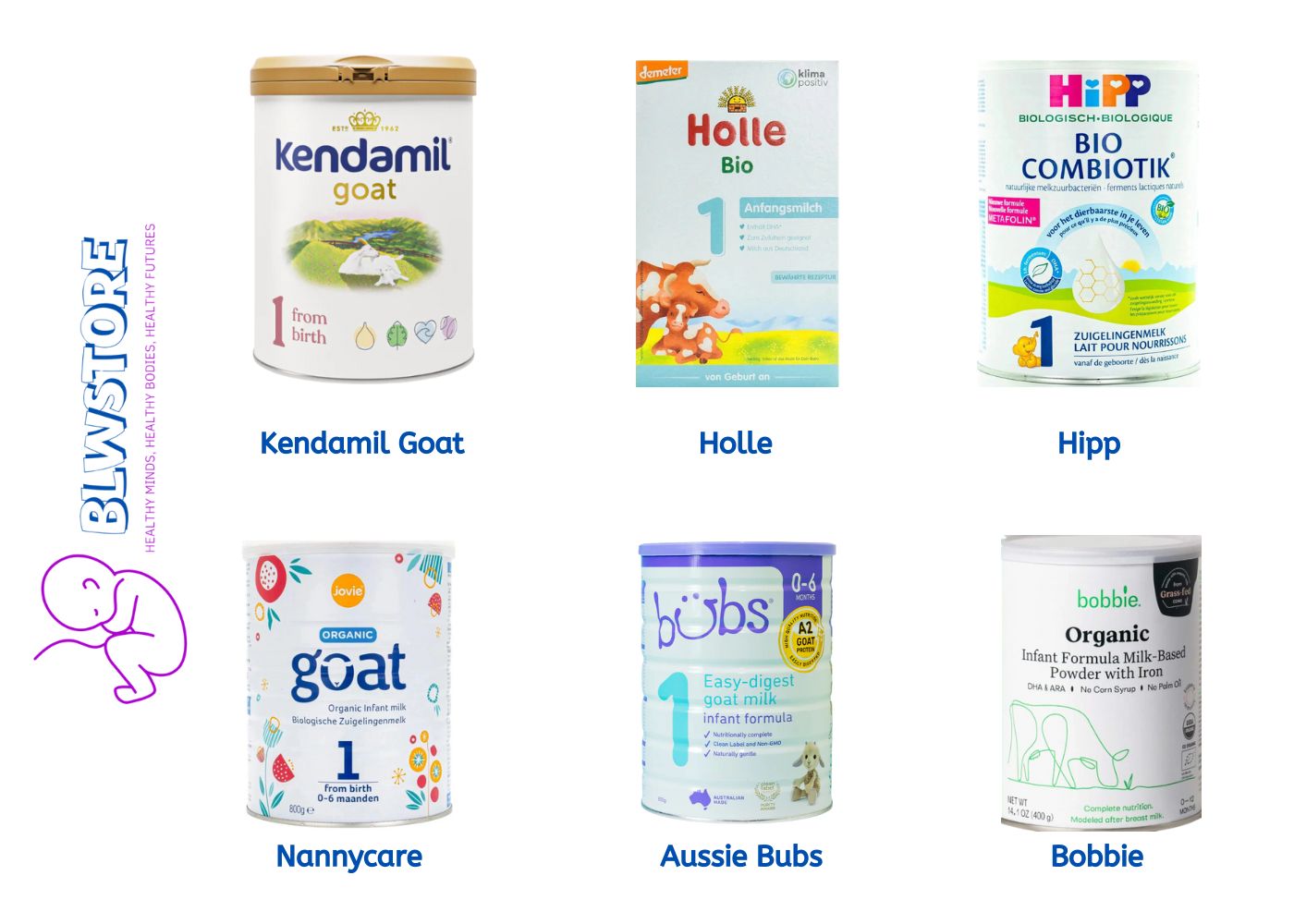
Many people think that buying organic food does not provide extra nutrients, and they are right.
We choose organic foods because they do not pose any long-term health risks, thanks to the fact that they do not have any chemicals or artificial ingredients.
This is precisely why we should offer our babies organic foods, including infant formula, because they are at the first stage of their lives, and as parents, we must aim to provide the best possible quality nourishment.
Everyone knows that breastfeeding is the best food for a baby, but if that is not possible, organic formula is the second best option, and they are not all the same.
After writing so many articles about infant formulas, we have finally decided to write one about the best organic formulas on the market. The ones we would buy if we were to have a baby again.
You may use the table of contents below to go directly to the formulas.
*We have not included any “buy here or purchase links” since we want this information to be as transparent and wholesome as possible. We are not trying to sell you anything. We want to help, for real.
Top 3 Best Organic Formulas In 2024
If you are unsure which one to go for, pick Kendamil; we don’t get tired of recommending it as our go-to formula brand.
Holle is the perfect option for you if you are looking for the purest ingredients with the best organic certifications.
Bobbie is your top option if you live in the US and want a local formula.

Best Overall: Kendamil Organic
It was the best, and it is still the best.
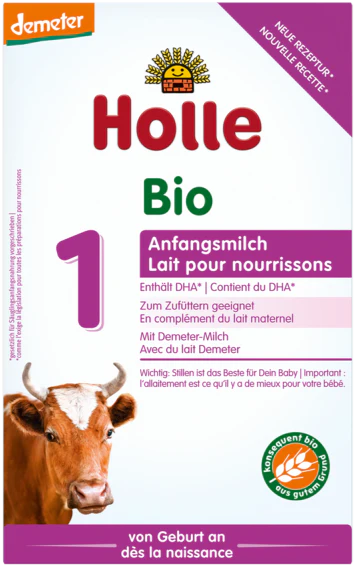
Best Organic Practices: Holle
Want the purest ingredients? Holle is your best choice.
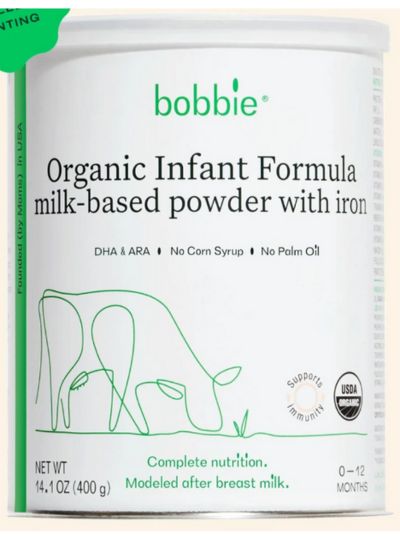
Best US-Based: Bobbie
Want a formula from the US? Then Bobbie is the perfect option.
What Sets Organic Formula Apart?
Organic infant formula is designed with a commitment to natural ingredients and farming practices that avoid synthetic pesticides, fertilizers, antibiotics, or growth hormones.
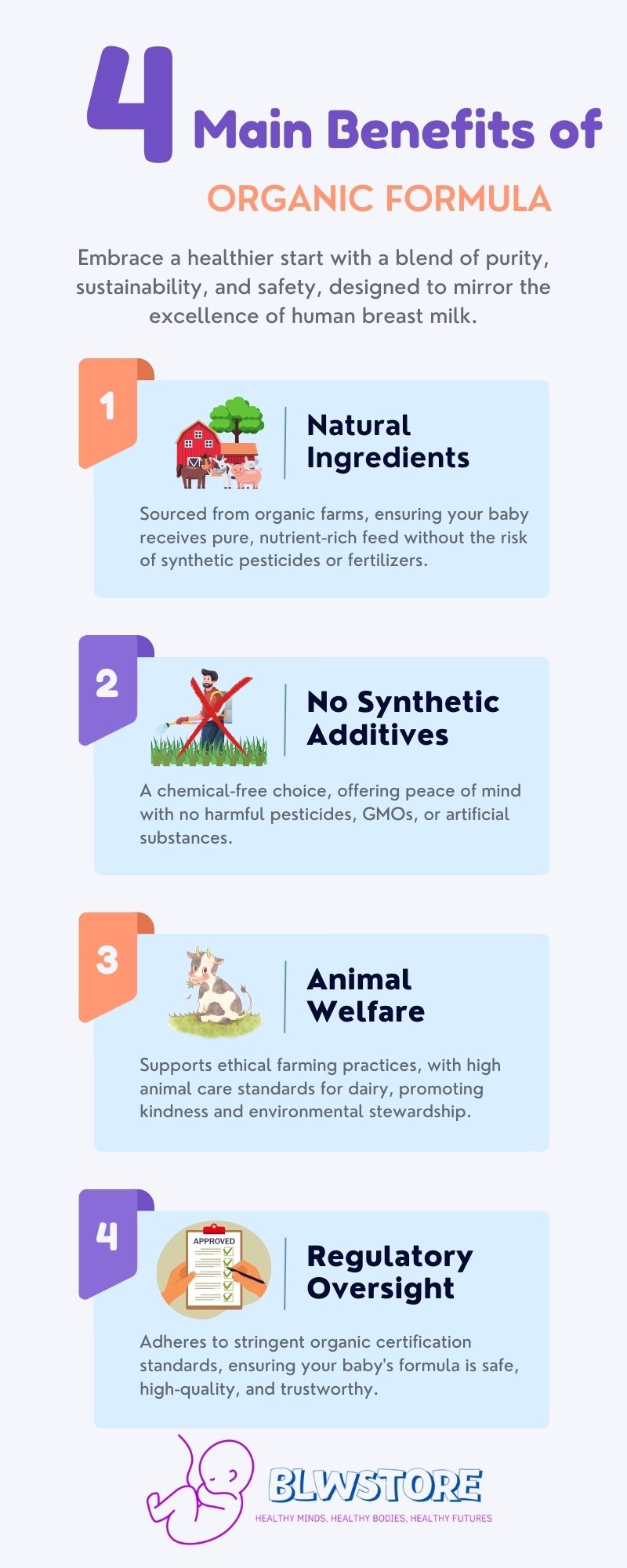
The goal is to provide babies with nourishing food that closely mimics human breast milk while ensuring environmental sustainability and animal welfare.
Key Features of Organic Formula:
- Natural Ingredients: Sourced from farms practicing organic agriculture.
- No Synthetic Additives: Free from harmful chemicals and GMOs.
- Animal Welfare: High standards of care for animals contributing dairy products.
- Regulatory Oversight: Stricter guidelines than conventional formulas, ensuring safety and quality.
EU vs. US Regulations on Infant Formula
European standards generally surpass those in the US regarding ingredient purity and production processes. European certifications like Demeter or Bioland mark even higher quality levels within organics.
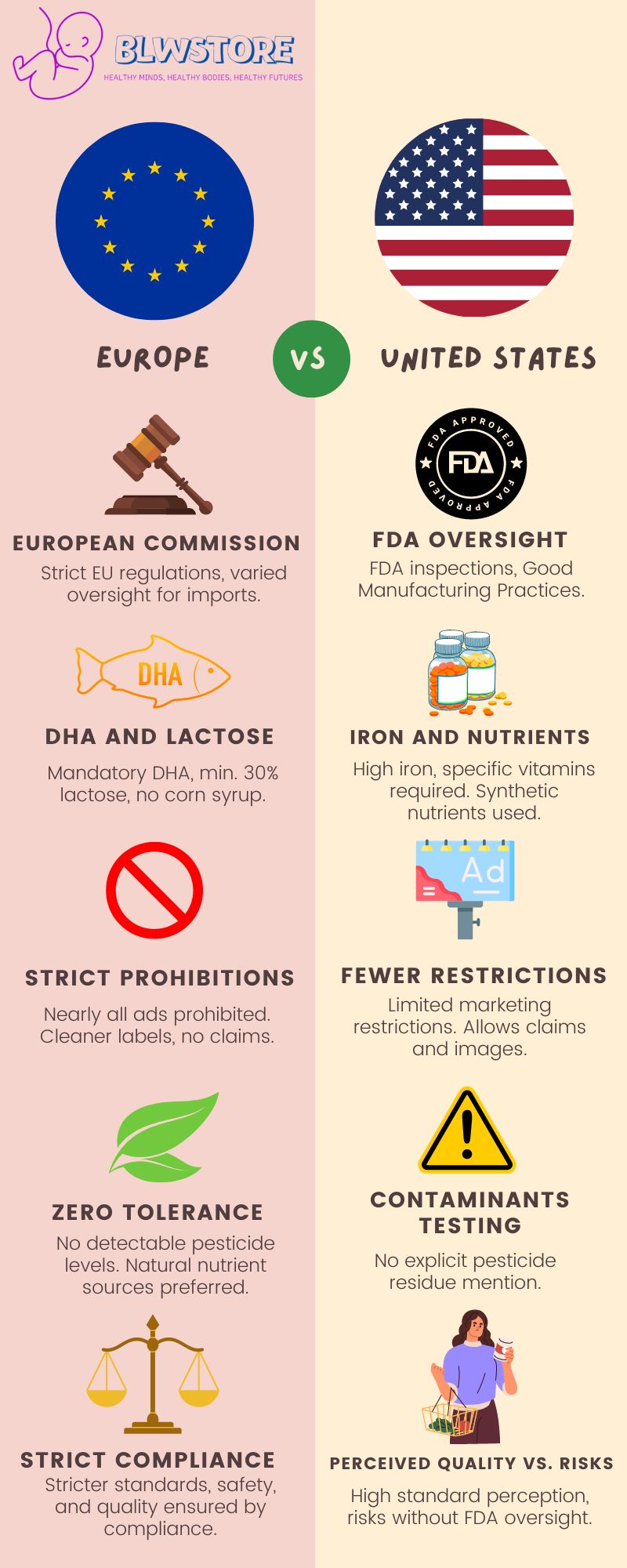
Here, you have a summary and a table with the differences between the EU and the US regarding their regulations on infant formula:
United States Regulations Overview
- Regulatory Body: Food and Drug Administration (FDA)
- Production and Safety: Strict guidelines on formula production, packaging, and labeling. Requirements for water safety, system of controls to prevent contamination, and testing for Salmonella and other contaminants.
- Nutrient Requirements: Dictates specific nutrients and vitamins that must be included. Formulas must be labeled as either “Infant Formula with Iron” or “Additional Iron May Be Necessary.”
- Organic Certification: Not regulated by the FDA but by private companies.
European Regulations Overview
- Regulatory Framework: Regulation (EU) No 609/2013, also known as the Regulation on ‘Foods for Specific Groups’ (FSG).
- Nutritional Content: Mandatory addition of DHA with specified concentration ranges. Restrictions on the use of corn syrup/solids and minimum lactose levels.
- Organic Standards: Certified by the European Commission with stricter standards than the US.
- Marketing and Advertising: Stricter restrictions, including prohibitions on claims, pictures of infants, and the use of nutrition and health claims on infant formula.
Comparative Analysis
| Aspect | United States | Europe |
|---|---|---|
| Iron Content | Higher iron content | Lower iron content |
| DHA | Not required | Mandatory addition with specific concentration ranges |
| Lactose | Allows use of corn syrup as a carbohydrate source | Requires at least 30% of carbohydrates to come from lactose |
| Pesticide Residues | Not explicitly mentioned | No detectable levels allowed |
| Synthetic Nutrients | Incorporates synthetic vitamins and minerals | Prefers nutrients sourced from natural origins |
| Formula Staging | One-size-fits-all approach common | Tailored nutrition for specific age groups (0-6 months, 6-12 months, 12+ months) |
| Marketing Restrictions | Fewer restrictions on formula marketing | Nearly all infant formula advertisements are prohibited |
| Regulatory Oversight | Frequent FDA inspections and required Good Manufacturing Practices | Imported formulas may not have the same level of oversight |
| Consumer Perceptions | European formulas perceived as higher standard but may pose risks without FDA oversight | Stricter standards and cleaner labels with fewer claims |
How to Choose the Best Organic Formula
Choosing the best organic formula for your child involves understanding nutritional ingredients, recognizing your child’s unique needs, and prioritizing natural, high-quality components.
Key Ingredients to Look For
| Key Ingredient | Details |
|---|---|
| Primary Carbohydrate Source | – Always Lactose (mirrors breast milk, supports development without artificial sweeteners or high processed sugars) |
| Protein Content | – Whey and Casein (60:40 ratio better) – Goat’s milk (if it’s available, it’s usually better for most babies) |
| Fat Composition | – Organic vegetable oils (coconut is the best one, palm is not the evil if it’s organic) – Avoid soy oil and palm olein |
| Vitamins, Minerals, & Nutrients | – Most formulas contain enough vitamins and iron – Choose formulas with high content of DHA and ARA |
| Special Additives | – If you can, choose a formula with HMOs and MFGM (supports immune function and brain development, mimics benefits of breast milk) |
Leading Organic Formula Brands
Europe
- HiPP: Founded in Germany in 1899, HiPP stands out in organic baby food and formula, rigorously testing its products for over 1,000 substances to guarantee superior organic quality.
- Holle: Since 1933, Holle has earned recognition for its organic infant formulas and baby porridges, firmly excluding chemical processing and preservatives to maintain natural integrity.
- Lebenswert: Affiliated with the Bioland Farming Association, Lebenswert delivers premium organic baby formula dedicated to sustainable organic farming methods.
- Kendamil: This British brand is noted for its organic formulas, emphasizing whole milk and natural components.
- Bebivita: Bebivita provides an array of baby foods and formulas, prioritizing quality and affordability in its commitment to young families.
- Humana: Humana’s range of baby formulas and foods is crafted to highlight natural ingredients and ensure nutritional balance for infants.
- Kabrita: Specializing in goat milk-based formulas, Kabrita offers a nutritious and gentle alternative suitable for infants.
- Jovie: Jovie brings high-quality goat milk-based organic formula options, catering to infants with specialized nutritional requirements.
- Nanny Care: Concentrating on goat milk formula, Nanny Care caters to babies with specific dietary needs, offering a viable alternative.
United States
- Earth’s Best: Earth’s Best provides an assortment of organic infant formulas, including a sensitive version for babies 0-12 months with reduced lactose content.
- Happy Baby Organics: Offering organic infant formula enriched with essential vitamins, minerals, and prebiotics, Happy Baby Organics aims to mimic breast milk closely.
- Bobbie: Bobbie celebrates its commitment to organic infant nutrition, adhering to USDA Organic, Kosher, and FDA quality standards, with its production based in Vermont.
- ByHeart: A pioneering brand in the US, ByHeart is dedicated to delivering organic infant formula with a focus on enhancing digestion and nutritional absorption.
Types Of Formulas Available
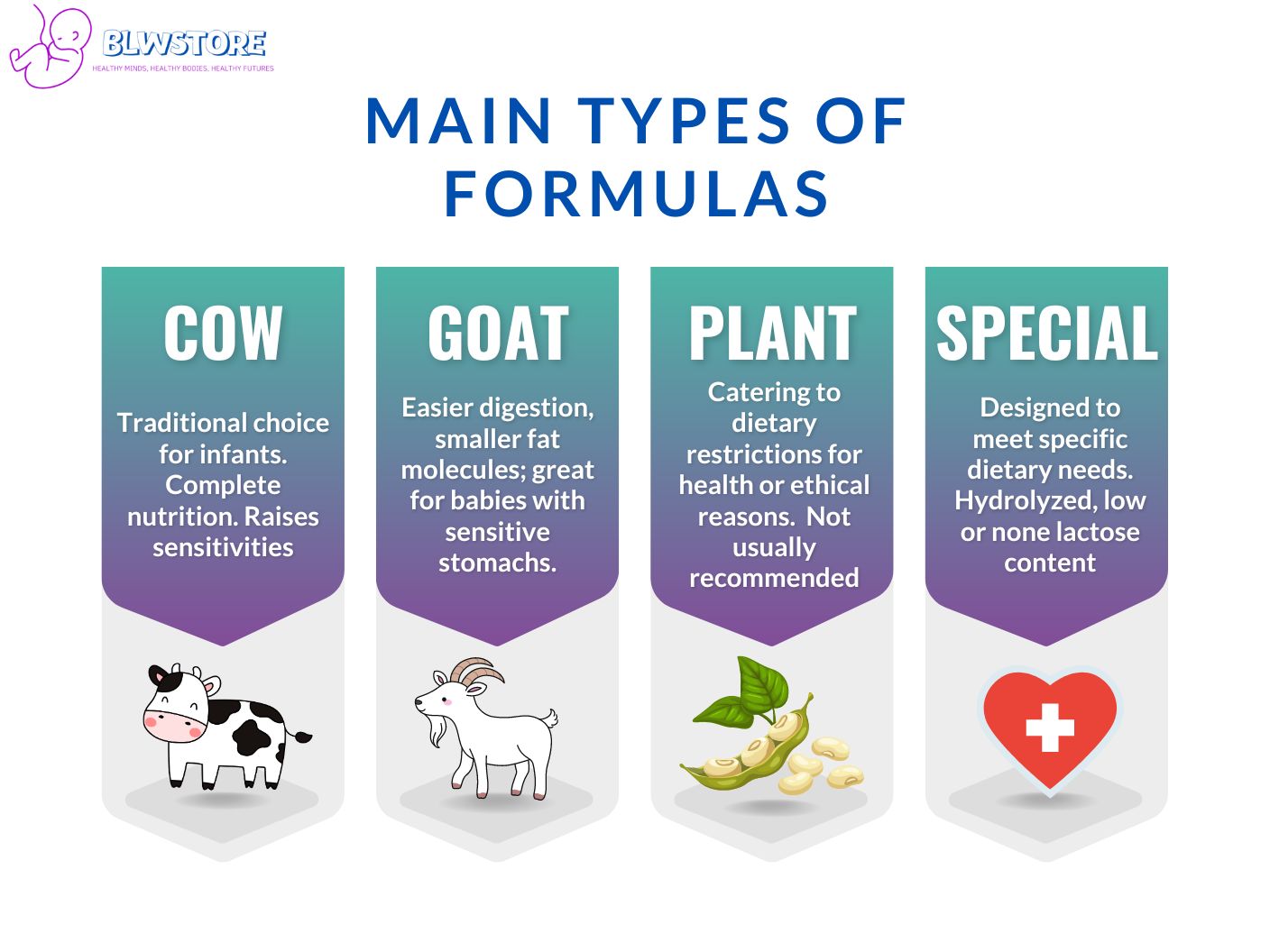
- Cow’s Milk-Based – Traditional choice utilizing lactose as a carbohydrate source regulated under strict conditions ensuring nutritious milk production.
- Goat Milk-Based – Offers easier digestion due to smaller fat molecules, making it an alternative for sensitive stomachs.
- Plant-Based/Vegan – Crafted from whole plant ingredients catering specifically to dietary restrictions owing to personal health choices.
- Specialty Formulas – Address specific dietary needs via extensively hydrolyzed proteins suitable from birth onwards.
What are Stages in European Formula?
European baby formulas are divided into different stages to meet the specific nutritional needs of babies as they grow.
Stages Pre and 1: From birth to 6 months.
Stage 2: From 6 to 12 months.
Stage 3 & Stage 4: 12+ months.
If you look at the labels and the nutritional information, the differences between stages are very small. If you start offering solid foods after the 6-months, you don’t have to change stages unless you want to.
How We Chose the Organic Formulas in This Article | Our Criteria
These are the factors we have looked at to make this list of the Best Organic Formulas:
- Lactose only
- Whole milk > Skimmed Milk (because milk fats are better than vegetable oil fats)
- Inclusion of HMOs
- Inclusion of MFGM
- Prebiotics (GOS)
- Use of Coconut Oil (the most nutritious vegetable oil)
- Avoidance of Soy Oil and unnecessary sugars like corn syrup
- Goat’s Milk > Cow’s Milk
- Organic Certifications like Demeter or Biodynamic farming > others
What are the Best Organic Formulas?
1. Kendamil

Kendamil Organic sets the gold standard for infant nutrition with its exceptional blend of organic ingredients, prioritizing baby’s health and development.
Why we chose it.
Kendamil Organic impressively stands out as the sole formula incorporating naturally found Human Milk Oligosaccharides (HMOs), a crucial component supporting infant immunity. These beneficial HMOs; 3’-GL, 4’-GL, and 6’-GL play a significant role in nurturing a baby’s immune system.
The high-quality milk sourced for Kendamil is processed directly at their facilities, ensuring the preservation of vital vitamins and proteins, which are often lost through third-party heat treatments.
This dedication to quality is evident as they choose full cream milk over skimmed alternatives to better mimic breast milk’s beneficial fats and nutritional profile – including essential Milk Fat Globule Membrane (MFGM) known for aiding cognitive development.
Kendamil’s formula enhances fat absorption, supports immune response, and aids overall growth by including nucleotides, taurine, ARA while avoiding cheap additives.
Opting for plant-based DHA instead of fish oil aligns with vegan preferences without compromising nutritional value.
The commitment extends to responsibly sourcing ingredients solely from UK Red Tractor Farms, ensuring animal welfare and safety standards are upheld – making Kendamil an unparalleled choice in infant nutrition.
Pros
- Incorporates critically important HMOs for immune support
- Free from undesirable additives such as palm or fish oils
- Sources ingredients responsibly emphasizing animal welfare and environmental sustainability
Cons
- Its availability from time to time
2. Holle

Holle leads in organic certifications, offering a formula enriched with nutrients from Demeter-certified farms and ensuring the highest biodynamic farming standards.
Why we chose it.
Holle takes pride in their unwavering commitment to clean, organic ingredients.
By sourcing milk from Demeter-certified farms – known for their rigorous biodynamic farming practices that surpass standard organic certifications – Holle ensures that the formula nourishes and does so in harmony with nature.
This holistic approach emphasizes chemical-free agriculture, animal welfare, and environmental sustainability.
Demeter certification represents the pinnacle of organic quality assurance.
It guarantees that every ingredient in Holle’s formulas adheres to high ecological and social responsibility standards.
Essential nutrients such as vitamins A, D, E alongside minerals, and essential fatty acids like DHA (docosahexaenoic acid) and ARA (arachidonic acid) are packed into this blend ensuring your baby receives comprehensive nutritional support without compromising on purity or ethical standards.
The absence of artificial sweeteners or genetically modified organisms underscores Holle’s dedication to both baby health and ecological well-being.
For parents seeking peace of mind through stringent organic credentials coupled with a nutritionally robust formula – Holle stands out as an unrivaled choice catering to these priorities seamlessly.
Pros
- Highest level of biodynamic/organic certification achievable
- Ensures holistic development with a balanced mix of essential nutrients
- Fully committed to ethical practices encompassing animal welfare
Cons
- Uses skimmed milk instead of whole
- Uses organic palm oil (We put it in cons because some parents do not like formulas with it, however, if it’s organic it’s more nutritious than other seed oils)
- No prebiotics
3. Hipp
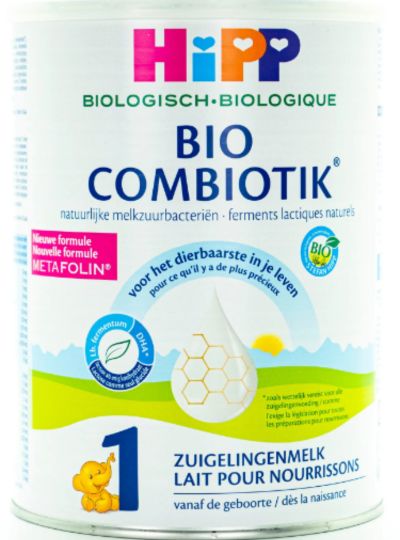
Hipp’s formula is tailor-made for easy digestion, closely mimicking breast milk with natural probiotic cultures and lactose as the main carbohydrate.
Why we chose it.
HiPP has meticulously crafted a formula that prioritizes digestibility while striving to emulate the nutritional profile of breast milk.
This commitment is evident through including natural probiotic lactic acid cultures derived from breast milk, promoting a healthier gut flora and aiding in smoother digestion for infants.
By making lactose the primary carbohydrate, like in breast milk, HiPP ensures its formula supports gentle digestion without using starch or other additives.
The significance of using EU organic-certified milk cannot be overstated. HiPP’s reliance on biodynamic farming practices guarantees that every ingredient in its formula respects animal welfare and environmental integrity.
By opting to keep common allergens such as gluten, soy, peanuts, and eggs out of their products, HiPP furthers its commitment to baby health.
Beyond these features, HiPP fortifies its formula with essential DHA (Omega-3) and ARA (Omega-6) fatty acids alongside vitamins A, D, and C to ensure comprehensive development support.
This combination of digestibility-focused formulation underpinned by rigorous organic standards makes HiPP an ideal choice for parents prioritizing ease of digestion without sacrificing nutritional quality.
Pros
- Superior digestibility facilitated by bio-cultures mimicking breast milk
- Exclusively uses lactose as carbohydrate for closer resemblance to mother’s milk
- Upholds stringent EU organic certification ensuring clean and responsible sourcing
Cons
- Uses skimmed milk instead of whole
- Uses organic palm oil (We put it in cons because some parents do not like formulas with it; however, if it’s organic, it’s more nutritious than other seed oils)
4. Jovie

Jovie offers a goat milk-based formula tailored for gentle digestion, suitable from birth to 6 months, fostering development and gut health.
Why we chose it.
Jovie stands out in the crowded infant nutrition space by centering its formulation around organic whole goat’s milk, a choice that brings many benefits.
Whole goat milk is renowned for its digestibility and nutritional profile, making it an excellent base for infant formula.
It contains gentler natural proteins on babies’ tummies and offers improved fat and calcium absorption, which is essential for growth and development.
Excluding palm oil and maltodextrin further reflects Jovie’s commitment to quality and digestibility.
Instead, the formula emphasizes clean ingredients like organic sunflower, rapeseed oil, and DHA (Omega-3) derived from fish oil and ARA (Omega-6), providing critical nutrients without compromising the gut’s comfort.
This nutritional approach is particularly advantageous for infants showing sensitivity toward cow’s milk or battling gastrointestinal discomfort. *Read: Goat vs Cow Milk Formula
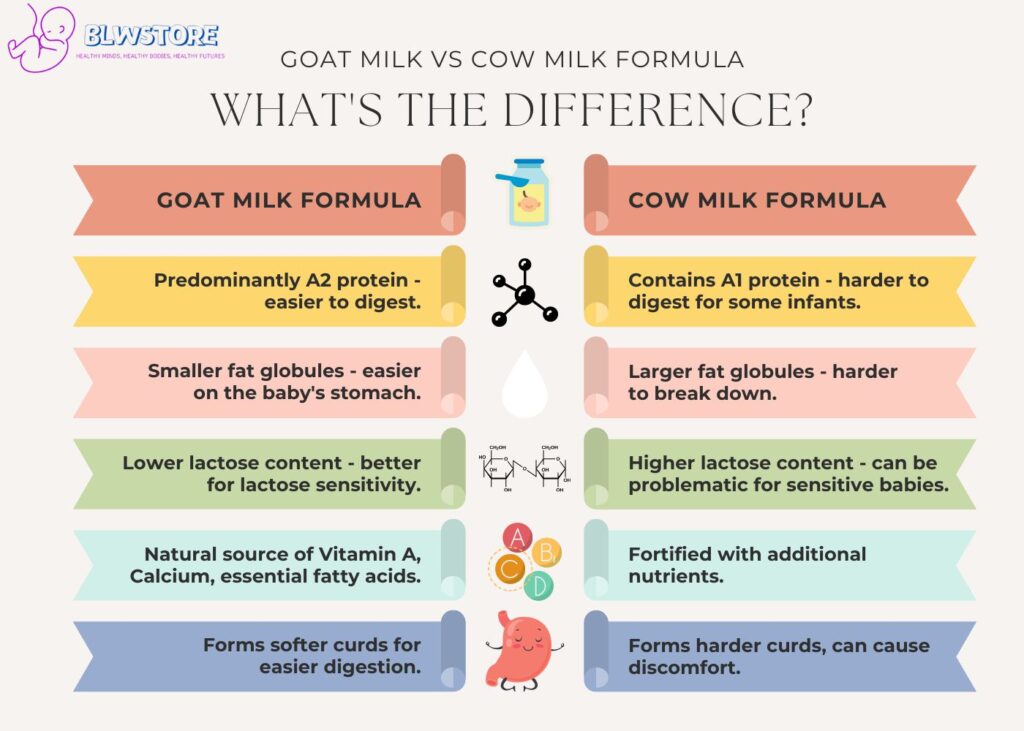
GOS (galacto-oligosaccharides) reinforces this benefit by nurturing a healthy gut microbiome.
Jovie’s commitment to using solely organic ingredients aligns with parents’ growing demands for purity in their baby’s diet – ensuring peace of mind regarding origin and manufacturing processes.
Pros
- Utilizes easily digested whole organic goat milk
- Only two vegetable oils
- Enriched with key fatty acids DHA & AA alongside essential vitamins
Cons
- Price and Availability
5. Aussie Bubs
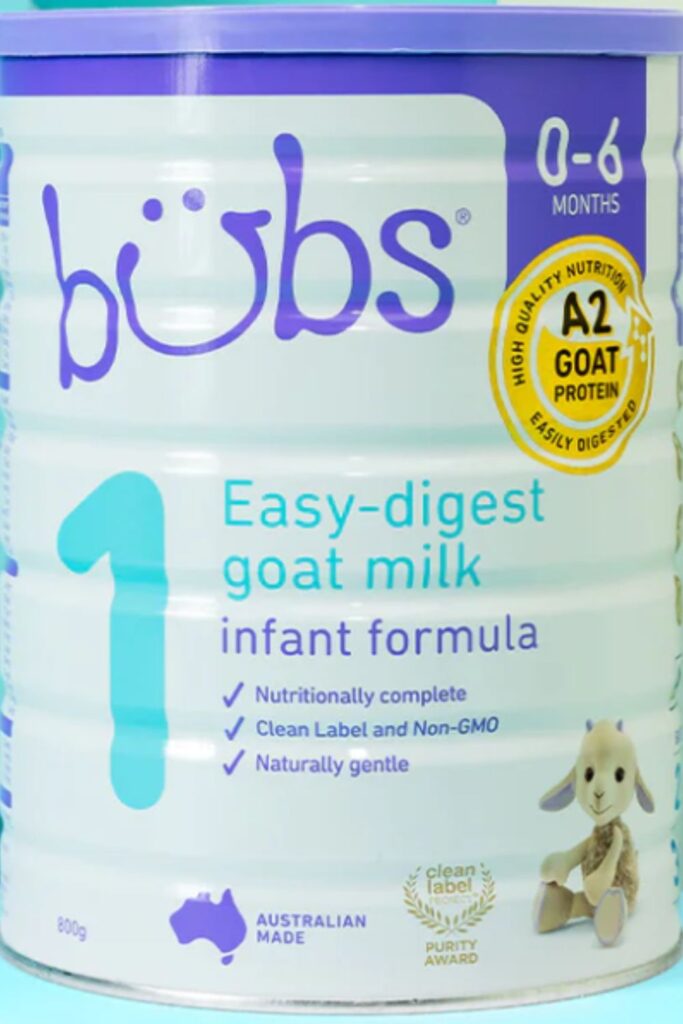
Aussie Bubs Goat formula brings the wholesome goodness of Australian dairy to your baby’s bottle, promising a pure, nutrient-rich start.
Why we chose it.
Aussie Bubs Goat distinguishes itself by utilizing natural milk from Australian goats.
This ensures a fresher product and allows for better taste, solubility, and retention of the milk’s natural nutrients.
Local sourcing reinforces the brand’s commitment to traceability and quality, ensuring that every scoop comes from farms where animals are raised following stringent standards.
In alignment with growing parental concerns over additives in infant nutrition, Aussie Bubs has commendably removed unnecessary fillers such as corn syrup solids, artificial sweeteners, GMOs, maltodextrin, artificial colors, and more from their formula.
This clean label approach is further verified by receiving the prestigious Clean Label Project’s Purity Award – a testament to their dedication to safety and purity in their products.
The cooperation with Australian State regulators ensures that Aussie Bubs adheres to rigorous testing for microbiological parameters before market release.
Pros
- Utilizes high-quality goat milk solids for excellent nutritional value
- Adheres to clean label standards avoiding unnecessary additives and sugars
- Strong regulatory oversight ensures product safety and quality
Cons
- May be less accessible globally due to its Australian origin
6. Bobbie
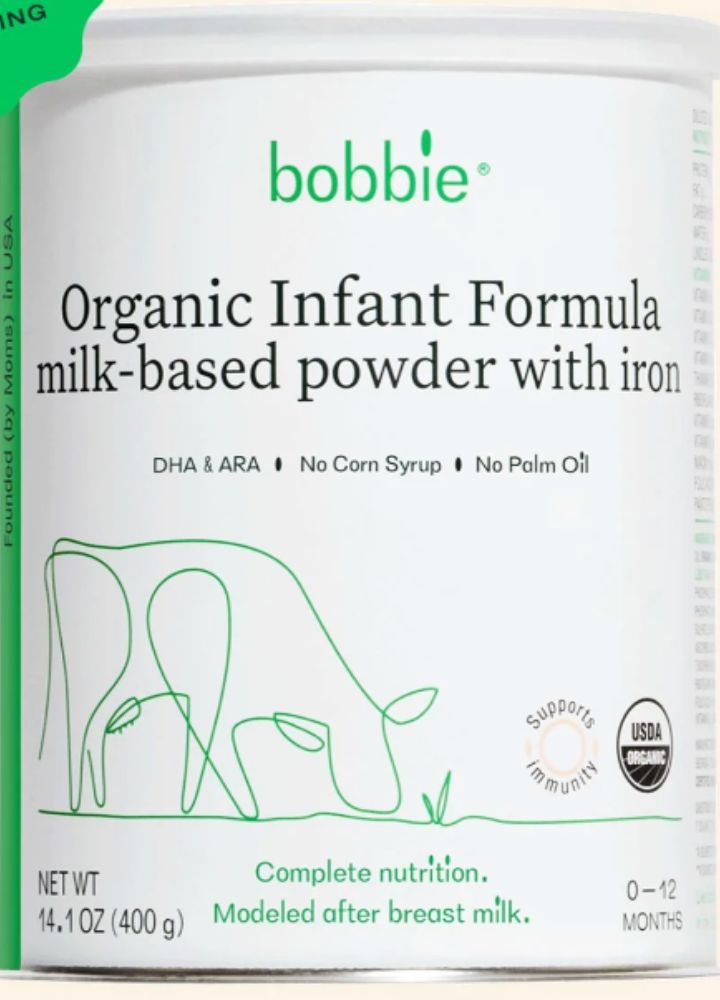
Bobbie leads the way as a premium US-based infant formula, focusing on organic and non-GMO ingredients for optimum infant health and development.
Why we chose it.
Rooted in a commitment to quality from start to finish, Bobbie has carved out a niche as the top US-based choice for parents prioritizing organic ingredients.
The company begins with an arsenal of carefully selected, certified pesticide-free, organic, and non-GMO components. This meticulous selection process means that each Bobbie scoop provides nutrition and peace of mind regarding what’s entering your baby’s system.
Bobbie’s approach to sourcing milk from pasture-raised cows through Organic Valley®, a cooperative of family-owned farms across the U.S., highlights their dedication to ethical practices.
These cows are fed a diet predominantly of grass, aligning with Bobbie’s emphasis on natural feeding practices.
Moreover, by incorporating essential fatty acids like DHA without resorting to corn syrup or other controversial substances, Bobbie mirrors European standards recognized for their stringent regulations on infant nutrition.
This seamless blend of high-quality fats from sources like coconut oil and expeller-pressed sunflower or safflower oil ensures babies receive vital nutrients processed without harmful chemicals.
Bobbie’s commitment to avoiding synthetic nutrients and striving for purity has led them to pass the Clean Label Project’s rigorous testing protocol for contaminants and phthalates.
Pros
- Emphasizes clean, organic sourcing from trusted U.S farms
- Avoids controversial additives commonly found in other formulas
- Receives high marks for safety and purity from authoritative bodies
Cons
- Uses skimmed milk, not whole
- No prebiotics
7. Byheart
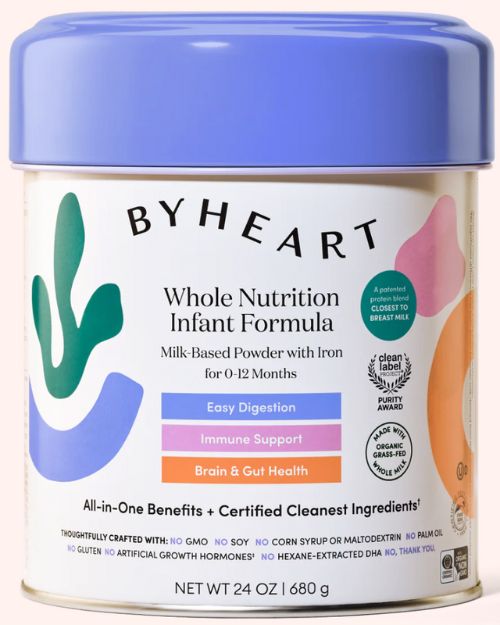
ByHeart redefines infant nutrition with a formula that blends organic, grass-fed whole milk with pioneering proteins for unprecedented closeness to breast milk.
Why we chose it.
In an industry first, ByHeart sets a new standard by offering the only US-made infant formula that incorporates organic, grass-fed whole milk alongside a patented protein blend.
This innovation stems from their dedication to closely mimicking breast milk’s nutritional profile.
By including alpha-lactalbumin (alpha-lac) and lactoferrin – the two most abundant proteins in breast milk.
This commitment to quality extends to what ByHeart leaves out.
With no room for corn syrup solids, gluten, soy, maltodextrin, hexane-extracted DHA, artificial growth hormones, or palm oil in their formulation, ByHeart prioritizes your baby’s health and safety above all.
ByHeart’s approach is not just innovative; it’s proven. Conducting the largest clinical trial by a new infant formula company in over 25 years — comparing its product directly to breast milk — highlights its confidence in its formulation.
Results showing benefits like easier digestion and stronger immunity underscore their commitment to excellence.
Pros
- Revolutionary blend closely mimics breast milk for superior nutrition
- Avoids all common allergens and controversial additives for enhanced safety
- Clinically proven advantages over leading formulas underscore effectiveness
Cons
- May be at a higher price point due to premium ingredients and innovative research
Last Words
We sincerely hope this post has helped you choose the best organic formula for your little one in 2024. We will keep updating the post yearly to keep up with the market.
If you have any questions regarding formula feeding or which formula to choose, you are welcome to leave a comment or contact us at [email protected], and we’ll be happy to help you.
Happy feeding!
We’re Maria and Alberto, a married couple and educators who are nutrition enthusiasts. Even before we had kids, we were already crazy about nutrition.
We’d read scientific articles, watch videos from nutritionists, and spend hours listening to nutrition podcasts.
Today, we continue doing this, but in a different way, as we’ve learned to sift through the noise and trends. Nutrition, like any other field of knowledge, the more you read and learn, the more you develop a comprehensive understanding of reality, and that’s what has happened to us.
Before having our first child, we focused on learning everything we could about child nutrition, using the same techniques we had already employed, backed by our extensive knowledge in nutrition.
Our mission is to help other parents with their children’s nutrition, to help them become the best versions of themselves.
If we are what we eat and drink, which is absolutely true, let’s do it right!
